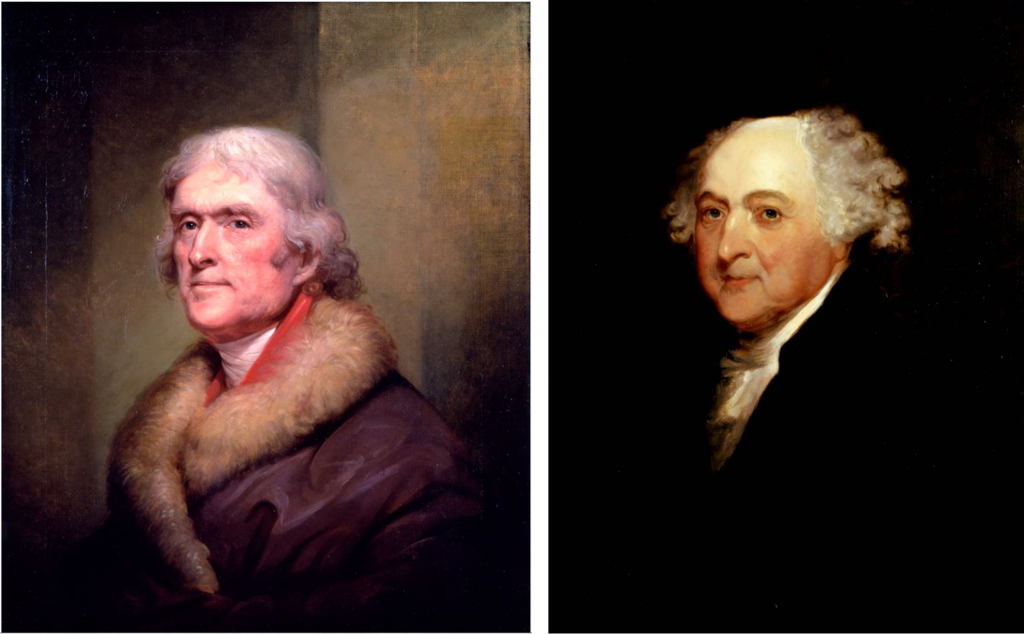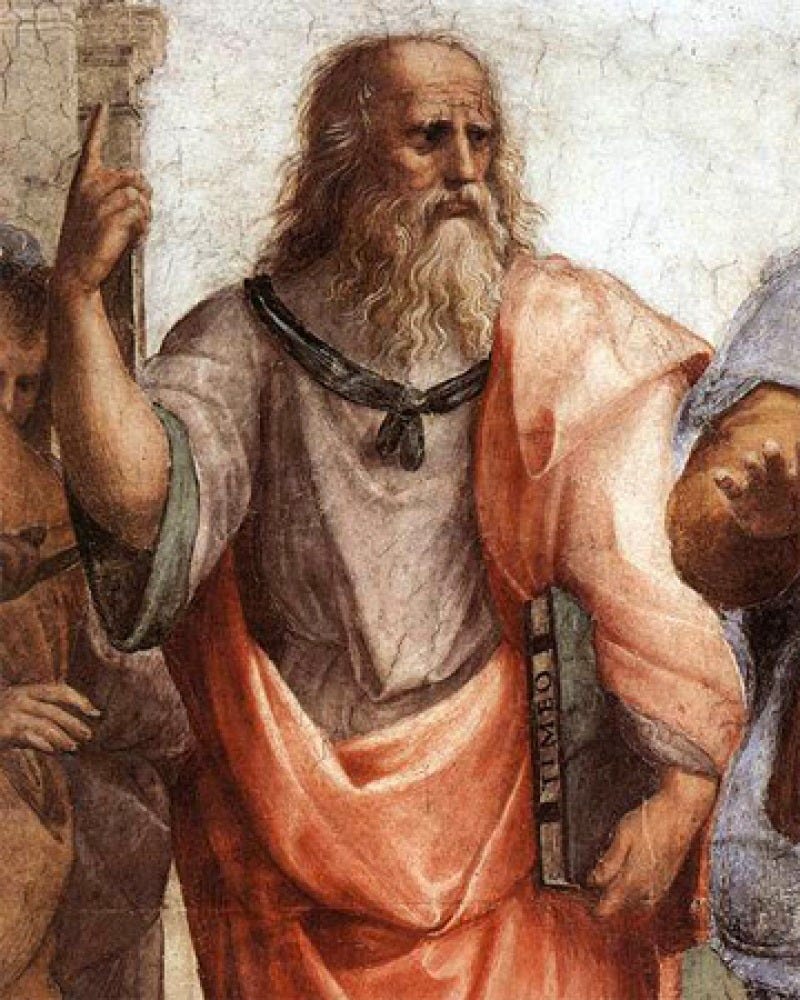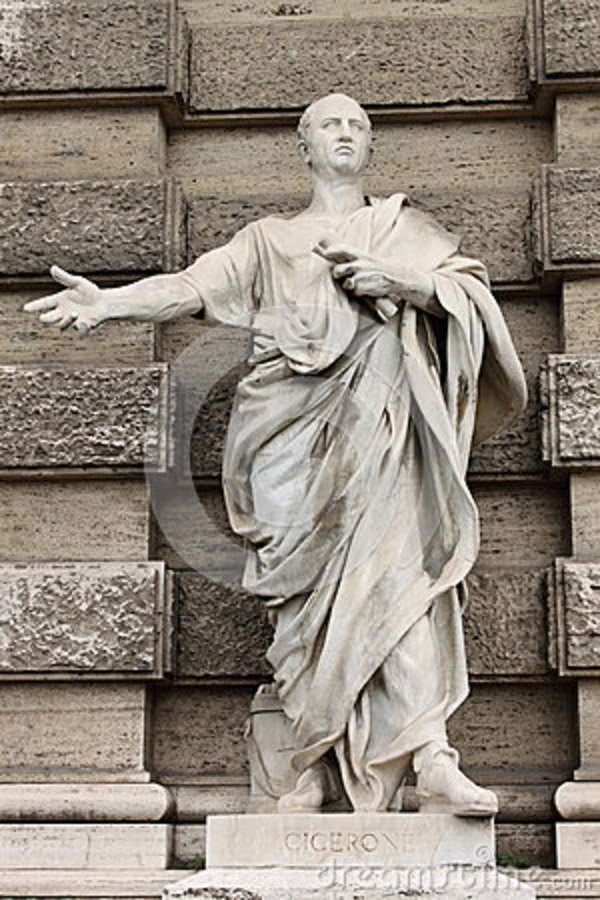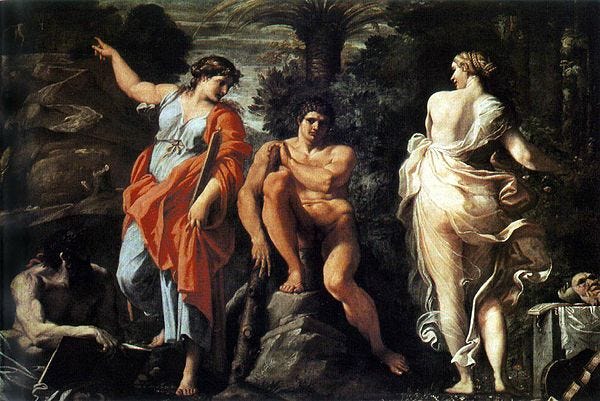It Usually Begins with Plato (or Cicero)!
A few thoughts on the founders and the Greeks and Romans
The good folks over at the online journal Cato Unbound recently hosted at small symposium on “The Founders, the Classics, and the Origins of Classical Liberalism.” Paul Meany of the Cato Institute wrote the lead essay on “Cicero, Locke, and the American Founding.” Roderick T. Long, a philosopher at Auburn University, wrote a reply titled “The Benefits and Hazards of the Classical Legacy,” and I wrote a reply to Meany as well, which I share here with my Substack readers.
There is still a lot of interesting work to be done on the founders’ confrontation with the ancient Greek and Roman poets, philosophers, historians, and playwrights, not to mention their views on Christ’s moral teaching and the origins of the early Church. As I indicate at the end of my essay, I think there is a lot of interesting and important work to be done on the relationship between Cicero’s moral teaching in De Officiis and Locke’s Essay Concerning Human Understanding. Both texts are seminal for understanding the revolution in the founders’ moral-political teaching.
A Response to Paul Meany
Paul Meany should be thanked for his interesting, informative, and insightful essay on “Cicero, Locke, and the American Founding.” For the last two generations, scholars of the American founding have largely divided between those who interpret the broader revolutionary era either through the lens of the classical-republican tradition or the Lockean-liberal tradition and never the twain shall meet.[1] Mr. Meany seems to suggest that these two traditions can in fact be reconciled by demonstrating the philosophic relationship between Cicero and Locke and both on America’s founding generation.
I think Meany is on to something important. He is right to draw our attention to the important role played by the ancient Greek and Roman classics in the formation of America’s revolutionary mind, particularly that of the Roman statesman and philosopher Cicero. In order to make both the general and the particular claim, however, some important distinctions must be made.
If Mr. Meany intends to turn his essay into something more ambitious (e.g., a book), he might consider expanding it to address the following questions:
1. Was America’s revolutionary generation influenced more by ancient Greek or Roman thought and practice?
2. Were the founders’ more influenced by the ancient philosophers, historians, poets, or rhetoricians?
3. Which particular ancient Greek and Roman authors most influenced America’s founding fathers?
4. Which ancient principles and institutions did America’ eighteenth-century liberals explicitly accept and reject?
5. What were the different contexts (e.g., moral, cultural, political, constitutional) in which the founding generation used various classical authors?
6. Can the views of the ancient moralists and political philosophers be reconciled with the modern principles of classical liberalism, and, more particularly, with the principles and institutions of the American founding? Specifically, can the ancient view of natural right be reconciled the modern doctrine of natural rights?
I have no intention myself of addressing all of these questions here, but I do think they are important enough to help Mr. Meany broaden and deepen his worthy project.
The Founders and Ancient Political Thought
This much we know with certainty. America’s revolutionary generation, particularly its leading thinkers and statesmen (e.g., James Otis, John Adams, John Dickinson, James Wilson, Thomas Jefferson, James Madison, and Alexander Hamilton) was steeped in classical Greek and Roman thought. To be educated in America’s eighteenth-century colleges meant an education in the texts of classical antiquity and in their original languages. The founding generation was intimately familiar with the works of Homer, Herodotus, Thucydides, Plato, Xenophon, Aristotle, Cicero, Polybius, Plutarch, Seneca, Epictetus, Tacitus, Sallust, Virgil, Ovid, Horace, and many others.
During their retirement years, for instance, John Adams and Thomas Jefferson loved nothing more than to relive their college days by reading and translating the ancient authors and then discussing them with each other. One amusing exchange on Plato’s political philosophy between the north and south poles of the American Revolution (as Daniel Webster referred to Adams and Jefferson) demonstrates just how invested they were in studying classical political philosophy. More to the point, the exchange illuminates some of the issues raised by Mr. Meany.
Plato’s “Puerilities”
On July 5, 1814, Jefferson wrote to Adams to tell him that that he had recently invested a significant amount of his time in reading Plato’s Republic, which he described as “the heaviest task-work I ever went through.” Jefferson was particularly peeved with Plato’s mysticism and its corrupting effect on Christianity, but he was also appalled by what we might call Plato’s communist republicanism, where property, wives, and children were shared in common (at least amongst the guardian order):
while wading thro’ the whimsies, the puerilities, & unintelligible jargon of this work, I laid it down often to ask myself how it could have been that the world should have so long consented to give reputation to such nonsense as this? . . . it is fortunate for us that Platonic republicanism has not obtained the same favor as Platonic Christianity; or we should now have been all living, men, women and children, pell mell together, like the beasts of the field or forest. . . . Socrates had reason indeed to complain of the misrepresentations of Plato; for in truth his dialogues are libels on Socrates.
Adams’s response to Jefferson is representative of the founders’ view of Platonic republicanism:
I am very glad you have Seriously read Plato: and Still more rejoiced to find that your reflections upon him, So perfectly harmonize with mine. . . . Some Parts of Some of his Dialogues are entertaining, like the Writings of Rousseau: but his Laws and his Republick from which I expected most, disappointed me most. I could Scarcely exclude the Suspicion that he intended the latter as a bitter Satyre upon all Republican Government, as Xenophon undoubtedly designed by his Essay on Democracy, to ridicule that Species of Republick.
Adams goes on to recount the hilarious story of how he once told John Taylor of Caroline that if he were a young man again, he would write a novel
in which The Hero Should be Sent upon his travels through Plato’s Republick, and all his Adventures, with his Observations on the principles and opinions, the Arts and Sciences, the manners Customs and habits of the Citizens Should be recorded. Nothing can be conceived more destructive of human happiness; more infallibly contrived to transform Men and Women into Brutes, Yahoos, or Dæmons than a Community of Wives and Property. . . .
Jefferson and Adams would have nothing to do with Platonic republicanism, which they regarded as anathema to the individualistic principles of the American founding. Hence they were both somewhat mystified that Cicero, whom they both deeply admired and whose ideas they frequently drew upon, seemed to have been a Platonist of some kind and whose two major works in political philosophy, De Republica and De Legibus, were written in imitation of Plato’s two major works by the same titles.
Cicero as Platonist?
Jefferson was particularly mystified by Cicero’s praise for Plato: “[H]ow,” he asked, “could Cicero bestow such eulogies on Plato?” Jefferson clearly seemed to think that Cicero’s political philosophy was anathema to Plato’s. Adams, who may have been eighteenth-century America’s greatest Ciceronian, responded by suggesting that the Roman statesman’s political philosophy was not as Platonic as it might first seem:
Cicero was educated in the Groves of Academus where the Name and Memory of Plato, were idolized to such a degree, that if he had wholly renounced the Prejudices of his Education his Reputation would have been lessened, if not injured and ruined. In his two Volumes of Discourses on government We may presume, that he fully examined Plato’s Laws and Republick as well as Aristotles Writings on Government. But these have been carefully destroyed; not improbably, with the general Consent of Philosophers, Politicians and Priests. The Loss is as much to be regretted as that of any Production of Antiquity. . . .
Cicero’s De Republica and De Legibus were not available to eighteenth-century Americans except as excerpts in the works of mostly Christian theologians such as St. Augustine’s The City of God. Adams was, I think, suggesting that Cicero’s two main political works were much less Platonic than was thought by some at the time. In fact, Adams’s use and interpretation of Cicero political thought in his magnum opus, A Defense of the Constitutions of Government of the United States of America (3 vols., 1787-88) is clearly non-Platonic in nature. Adams’s understanding of what a republic is was clearly formed by his reading of Cicero, whom he quotes frequently in his Defense when defining what republicanism is. Adams there defined a republic as
a government in which the property of the people predominated and governed; and it had more relation to property than liberty. It signified a government, in which the property of the public, or people, and of every one of them, was secured and protected by law. This idea, indeed, implies liberty; because property cannot be secure unless the man be at liberty to acquire, use, or part with it, at his discretion, and unless he have his personal liberty of life and limb, motion and rest, for that purpose. It implies, moreover, that the property and liberty of all men, not merely of a majority, should be safe; for the people, or public, comprehends more than a majority, it comprehends all and every individual; and the property of every citizen is a part of the public property, as each citizen is a part of the public, people, or community. The property, therefore, of every man has a share in government, and is more powerful than any citizen, or party of citizens; it is governed only by the law.
America’s Ciceronian republicanism was grounded in the fundamental rights to liberty and private property as secured and protected by the rule of law. Here we clearly see a link between ancient and modern republicanism, between Cicero and Locke. Ciceronian and Lockean republicanism very much share a common respect for liberty, property, and the rule of law, which form the cornerstone principles of the classical liberal tradition.
In addition to the founders’ acceptance of Ciceronian republicanism, the founding generation also borrowed two related concepts from ancient Greek and Roman authors, namely, the idea of a mixed and balanced republic and the cycle theory of regime change. They learned the former primarily from Aristotle’s Politics and the latter primarily from Polybius’s The Histories. (Many years ago when I was doing the research for what would become my book on John Adams and the Spirit of Liberty, I had the great thrill to read John Adams’s personal copy of Aristotle’s Politics along with his marginalia in the rare books reading room at the Boston Public Library.)
With the exception of these three political principles learned from ancient Greek and Roman authors, America’s founding generation really were the proponents of what Alexander Hamilton referred to in the ninth essay of The Federalist as the modern science of politics, the principles and institutions of which were: 1) “The regular distribution of power into distinct departments”; 2) “the introduction of legislative balances and checks”; 3) “the institution of courts composed of judges holding their offices during good behavior”; 4) “the representation of the people in the legislature by deputies of their own election”; and, 5) “the ENLARGEMENT of the ORBIT within which such systems are to revolve, either in respect to the dimensions of a single State or to the consolidation of several smaller States into one great Confederacy.” Such principles, Hamilton wrote, were “either not known at all, or imperfectly known to the ancients.”
In sum, American revolutionaries learned some political principles from the ancients but by no means all of their principles. Their new science of politics owed much more to Locke, Montesquieu, and Hume than it did to the ancient republican authors. On balance, their political views were more modern than ancient.
The Founders and Ancient Moral Thought
But there is, I think, a more important connection between the ancient Greek and Roman philosophers and America’s revolutionary generation, and that concerns the ancients’ moral thought and practice. This is the field where the ancient authors exerted their greatest influence on classical liberal theory and practice, and it is a subject that has gone largely unexamined in the scholarly literature. Much can be written on this under-studied but important subject, but I have already greatly exceeded my assigned word limit and so I shall indicate the connection only briefly.
The historical record is clear that Greek and Roman moralists exerted a profound influence on many of America’s leading founders (e.g., John Adams, Thomas Jefferson, and James Wilson). This influence can be seen most clearly in two ways: first, in how the founders read and used the ancient moralists to improve their own moral characters, and, second, in the advice they gave to the young people in their charge. As proponents of a free society, America’s revolutionary statesmen understood that political self-government must be propped up by individual moral virtue, particularly the virtue of self-government. On that subject they most often turned to Cicero’s book on moral obligations, De Officiis.
Allow me to illustrate this claim with a double-barreled example from the Adams family.
In 1759, when John Adams was 24 years old and studying the law, he recorded in his diary an extraordinary mental exercise that he had engaged in during a period in which he was studying Cicero’s moral advice. In Book I of De Officiis, Cicero recounts the famous story of “The Choice of Hercules” first told in Xenonphon’s Memorabilia (2.1.21-34) and then captured artistically in Annabale Carracci’s 1596 painting and in G. F. Handel’s 1750 Oratorio. “The other night,” Adams wrote to himself, “the Choice of Hercules came into my mind, and left impressions there which I hope will never be effaced nor long unheeded.” In the same way that Adams would decades later suggest that he write a novel about a young man’s journey through Plato’s best city in speech, he “thought of writing a Fable” adapted to his own life on the “same Plan” as that of Hercules.
The soliloquy began this way: “Let Virtue address me”—
“Which, dear youth, will you prefer, a life of effeminacy, indolence and obscurity, or a life of industry, temperance and honor? . . . let no trifling diversion, or amusement, or company, decoy you from your book; that is, let no girl, no gun, no cards, no flutes, no violins, no dress, no tobacco, no laziness, decoy you from your books. . . . But keep your law book or some point of law in your mind, at least, six hours in a day. . . . Labor to get distinct ideas of law, right, wrong, justice, equity; search for them in your own mind, in Roman, Grecian, French, English treatises of natural, civil, common, statute law; aim at an exact knowledge of the nature, end, and means of government; compare the different forms of it with each other, and each of them with their effects on public and private happiness.”
The young man ended his homily be admonishing himself to “Study Seneca, Cicero, and all other good moral writers.”
Twenty-one years later, when John’s Adams’s first son, John Quincy, was 13 years old and attending a boarding school in France, the boy received a series of letters from his mother and father on virtue and moral self-government. Both parents held up Cicero as a model of moral virtue and the “Character of the Hero and the Statesman.” Abigail implored her son to remember that he had certain moral obligations to himself, that
due Government of the passions has been considered in all ages as a most valuable acquisition, . . . and learn betimes from your own observation and experience to govern and controul yourself. Having once obtained this self government you will find a foundation laid for happiness to yourself and usefulness to Mankind. ‘Virtue alone is happiness below,’ and consists in cultivating and improveing every good inclination and in checking and subduing every propensity to Evil.
John Adams reinforced his wife’s admonition by telling their young son that his “Books of Morals” should be his “most constant Companions” throughout his “Hours of Relaxation” and, indeed, “through the whole Course of your Life.” He later told his son, “Morals, my Boy, Morals should be as they are eternal in their nature, the everlasting object of your Pursuit.” To that end, Adams senior never failed to tell his son to read Cicero, Seneca, Tacitus, and Livy in order to “learn Wisdom and Virtue.” (Interestingly, among the modern moralists, Adams recommended that his son read Jean Barbeyrac’s “An Historical and Critical Account of the Science of Morality,” which appeared as a preface to Samuel Pufendorf’s Of the Law of Nature and Nations [1729]). Father Adams well knew that a free society made up of moral reprobates cannot last.
I conclude with one final suggestion for Mr. Meany: you will find much to think about in studying the relationship between Cicero’s discussion of the moral laws of nature in De Officiis with that of Locke’s discussion of the same topic in the Essay Concerning Human Understanding. Here you will find the secret link between ancient and modern liberalism.
Notes
[1] For scholars who interpret the founding through the lens of classical republicanism, see Gordon Wood, Creation of the American Republic (1969); J. G. A. Pocock, The Machiavellian Moment (1975); and M. N. S. Sellers, American Republicanism: Roman Ideology in the United States Constitution (1994). For scholars who interpret the founding through the lens of Lockean or Enlightenment liberalism, see Thomas L. Pangle, The Spirit of Modern Republicanism: The Moral Vision of the American Founders and the Philosophy of Locke (1988); Michael Zuckert, The Natural Rights Republic: Studies in the Foundation of the American Political Tradition (1996); and C. Bradley Thompson, America’s Revolutionary Mind: A Moral History of the American Revolution and the Declaration that Defined It (2019).





Thank you for this, Dr. Thompson--very informative to me.